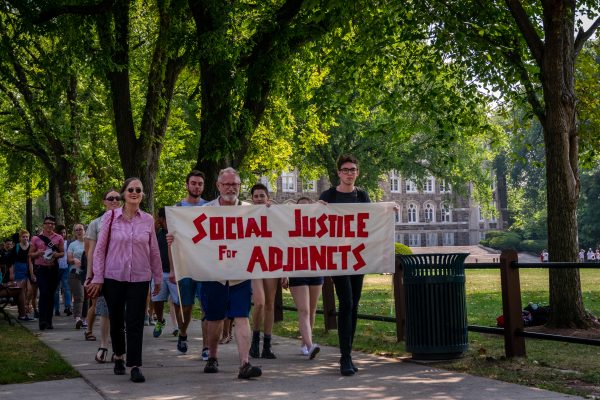Adjunct Faculty Protest Low Wages
Fordham Faculty United protesting low wages at the Rose Hill campus in September 2016. (ANDREA GARCIA/THE OBSERVER)
September 14, 2016
On Thursday, Sept. 8, Fordham Faculty United (FFU), a group comprised of adjunct faculty members at Fordham, staged a rally at the Rose Hill campus.
The group delivered a petition to Rev. Joseph M. McShane, S.J., president of the University, to contend for better wages, more comprehensive benefits and just treatment.
As of Friday, one day after the rally, 394 people supported the online petition.
“The petition’s goals were specifically to address the administration, who should be familiar with the low wages they’re paying us and the lack of health benefits, retirement, that sort of thing,” Kathryn Krasinski, Ph.D., a member of the organizing committee of FFU, said. “But also it’s for the whole Fordham community.”
Members of the group delivered the petition to McShane and the University’s legal team following the rally. They are giving McShane one week to respond to the demands in the petition, according to a post on the Fordham Students United Facebook page.
“The more that I talk about this topic, the more I realize that most of my students really are not familiar with the adjunct system,” Krasinski continued. She thinks that if students realized how the adjunct and contingent faculty “were being compensated, the system would quickly collapse because adjunct teaching conditions are students’ learning conditions. When professors are teetering on the poverty level and running to some other job, or multiple jobs, they cannot provide the high quality education Fordham claims to offer.”
Krasinski also contests the unjust treatment of adjunct faculty by the administration.
When a student tried to call the phone number listed under Krasinski’s name in the directory, the call was automatically directed to the Fordham Rose Hill (FRH) Dean’s office, as this is where calls to her phone number go. The student asked to speak with Krasinski and was told that adjuncts do not have a place on campus, according to an email from Krasinski.
After the student relayed this experience, Krasinski called her own phone number. According to Krasinski, she asked for her own name when the call was automatically directed to the FRH Dean’s office and was then told, “adjuncts do not have a physical presence here. They do not have a phone or office. That is the policy of Fordham University.”
In the email explaining the events, Krasinski stated, “This says volumes about what Fordham thinks of its adjuncts.”
Other demands included in the petition to ensure the just treatment of adjunct and contingent faculty are that the University adopt the Jesuit Just Employment Policy, that there be a public meeting with McShane, the Provost and a panel of adjunct and contingent faculty, and that the University live up to the pronouncement of the United States Conference of Catholic Bishops.
This pronouncement is stated in the petition and asserts, “If the dignity of work is to be protected, then the basic rights of workers must be respected—the right to productive work, to decent and fair wages, to the organization and joining of unions, to private property, and to economic initiative.”
The Jesuit Just Employment Policy petitions for a university that adopts the policy to recognize “the connection between its Catholic faith and its moral commitment to promote a just work environment,” as written in a model policy on the Just Employment Policy’s website.
Georgetown University, another Jesuit university in Washington, D.C., adopted the policy last November.
Krasinski stated that the administration can start taking action now by adopting the policy. “Georgetown has already done this and if Fordham really wants to be the leader it claims to be, it can do this immediately,” she said.
“We’re happy to work with the administration if they’re willing to take action immediately,” Krasinski continued. “We can start generating a plan to adopt the Jesuit Just Employment Policy, but if these actions don’t happen within the month, we’re going to need to find alternative solutions. Too many of us are living on the verge of losing an apartment, not being able to buy food, pay bills and provide for our families.”










